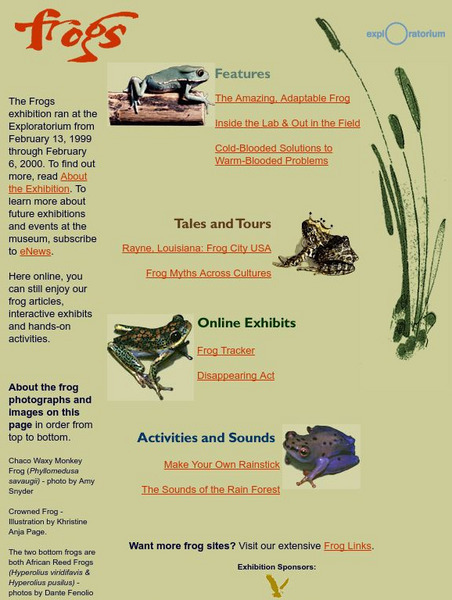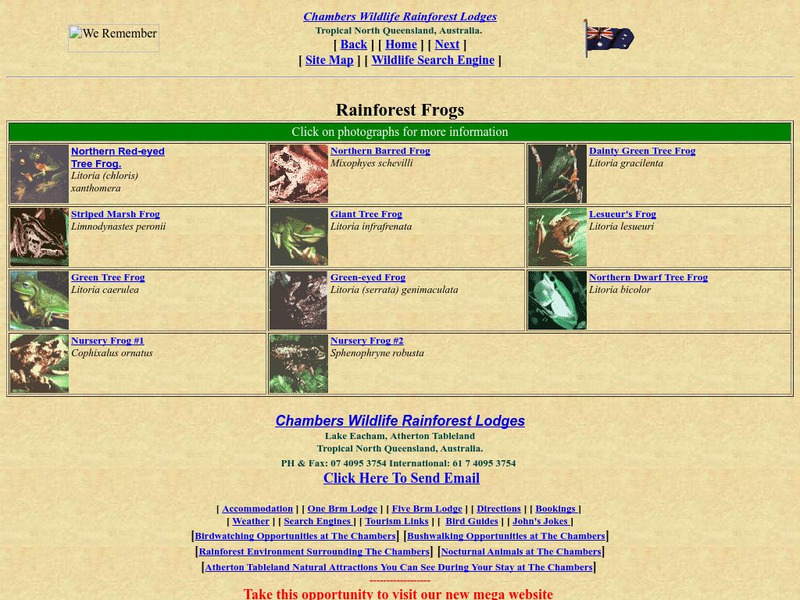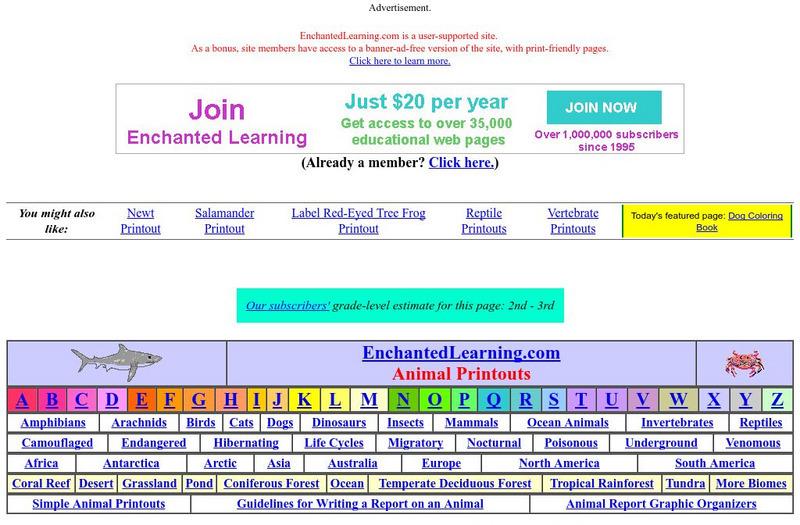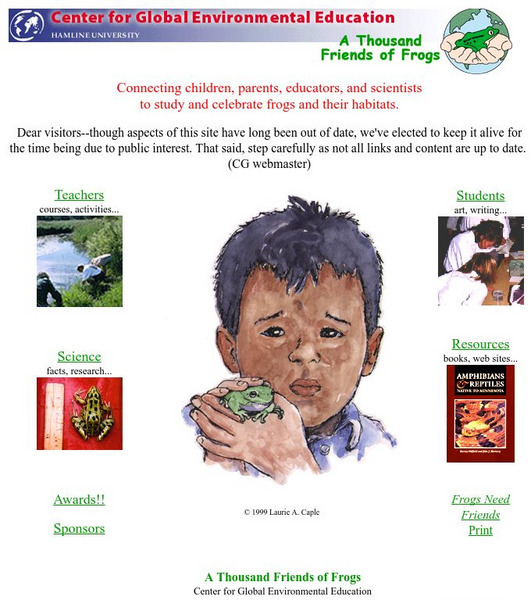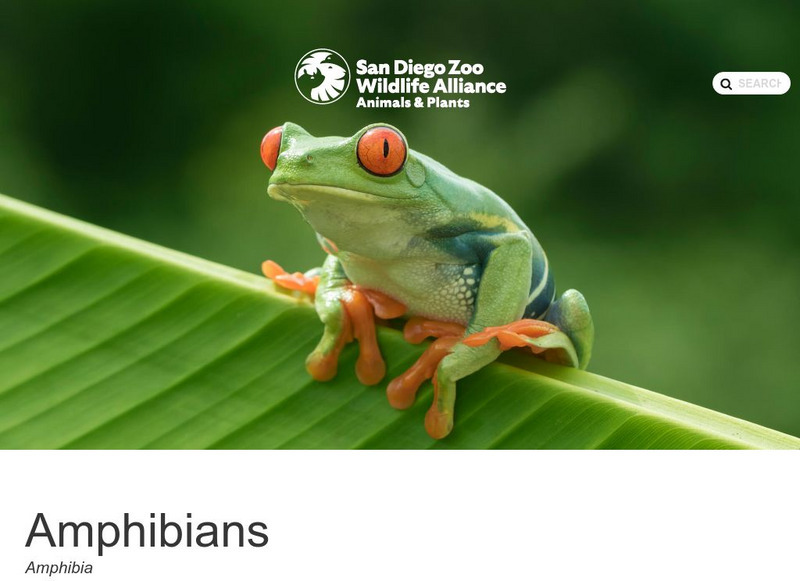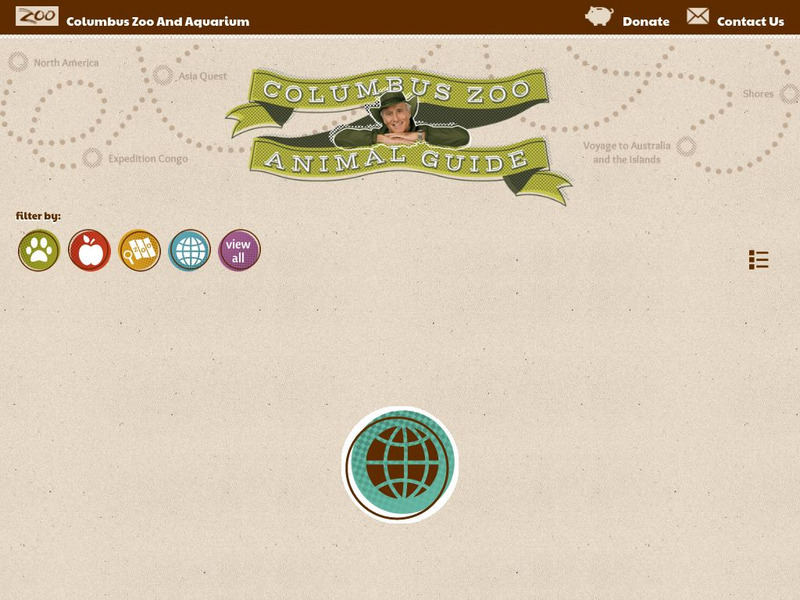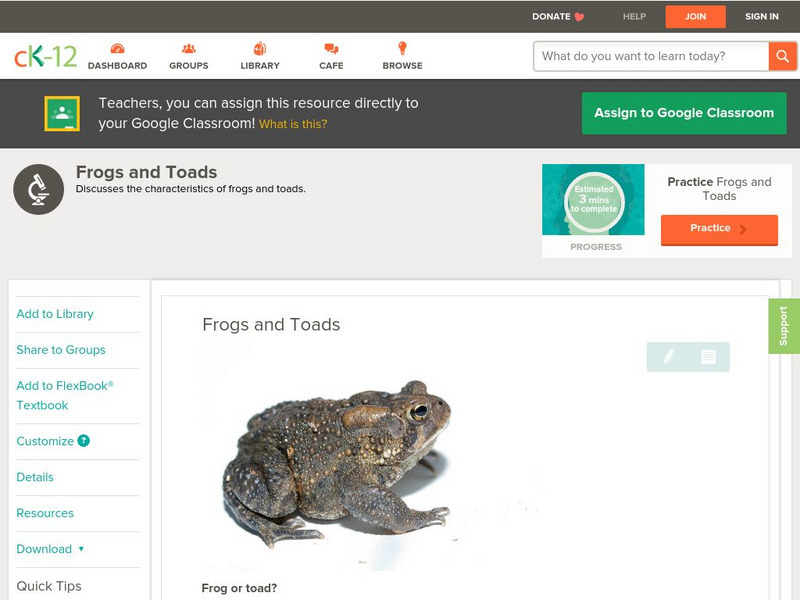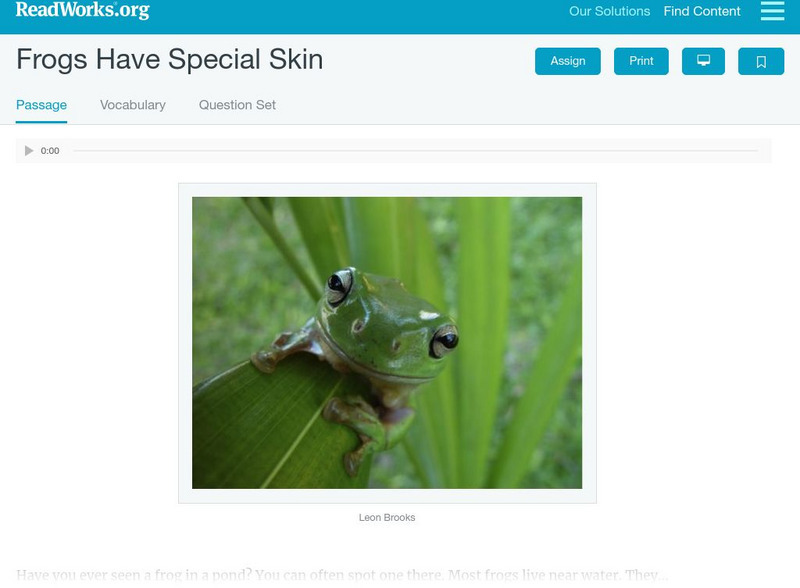National Geographic Kids
National Geographic Kids: Animals: Poison Dart Frogs
National Geographic site engages users with colorful photos and extensive facts about Poison Dart Frogs.
Exploratorium
Exploratorium: Frogs
The Exploratorium museum in San Francisco provides this exhibit companion site that features information about frogs including their habitats, characteristics, calls, and much more. Instructions are included for making a rain stick.
Natural History Museum
Natural History Museum: Reptiles, Amphibians and Fishes
This online exhibit from the Natural History Museum branches out in many fields to cover the broad topics of reptiles, amphibians and fishes. Thirteen subtopics are provided including several videos and informative articles.
National Health Museum
Access Excellence: Graphing Frog Respiration
This is a lesson plan for a science lab recording and graphing the respiration of frogs. Includes background information for teachers, preparation information, and detailed explanation of the activity.
Other
Project Exploration: Project Frog
This site documents the field work of PhD researcher Dave Blackburn as he travels through Cameroon in the sub-Saharan region of Africa to study some little known amphibians. If you think you'd like learning about the hairy frog, or some...
University of Michigan
University of Michigan Critter Catalog: Amphibians
This site provides a general description of amphibians and then describes in detail the characteristics of local animals in southern Michigan. Pictures, classification information, and sound clips of some amphibians are provided.
Unite for Literacy
Unite for Literacy: Mystic Aquarium: Be a Friend to Frogs!
Learn interesting facts about frogs in this book. Frogs face dangers from human activities and you will read about some things that you can do to protect them. Includes audio narration in English and Spanish with text in English.
Other
Australian Rainforest Wildlife: Rainforest Frogs
Here you can find information on the frogs found in the Australian rainforest. Select a species for a photo and more detail.
National Geographic Kids
National Geographic Kids: Animals: Red Eyed Tree Frogs
National Geographic site engages users with colorful photos and extensive facts about Red-Eyed Tree Frogs. Be sure to click on the video link to view a short clip on these fascinating animals.
University of Wisconsin
University of Wisconsin: Amphibian Embryology
This tutorial goes into great detail describing the embryological development of amphibians. Written explanations, photos and quicktime movies are all included.
Enchanted Learning
Enchanted Learning: Amphibians
Come and check out this awesome amphibian resource from EnchantedLearning.com. Students and teachers will benefit from the printouts found within this site. Some printouts are in different languages.
Other
Center for Global Environmental Education: A Thousand Friends of Frogs
An in-depth site about the world of frogs. The site includes teacher, student, science, and research sections. There are plenty of facts and activities.
San Diego Zoo Global
San Diego Zoo: Amphibians
This resource offers extensive information about amphibians. Visitors can click on the listed amphibians for further information.
Other
Columbus Zoo and Aquarium: Amphibians
This interactive animal guide from the Columbus Zoo highlights general information and fun facts about amphibians such as the Panamanian Golden Frog and the Poison Dart Frog. Select an animal from the list to begin exploring.
CK-12 Foundation
Ck 12: Life Science: Frogs and Toads
[Free Registration/Login may be required to access all resource tools.] Frogs and toads are amphibians in the order Anura. In terms of classification, there is actually not a big difference between frogs and toads. Learn more about frogs...
CK-12 Foundation
Ck 12: Biology: Amphibian Classification
[Free Registration/Login may be required to access all resource tools.] Describes how amphibians are classified into three orders.
University of Wisconsin
University of Wisconsin: Amphibian Embryology Tutorial
This amphibian embryology tutorial takes an in depth look at the question "Why study amphibians?". Through this tutorial students will develop a better understanding of vertebrate development.
Exploratorium
Exploratorium: Frogs, a Disappearing Act
At this site students can read about how frogs camouflage to avoid predators. There is an interactive exhibit too! (Must have the Shockwave plug-in to see animation.)
American Museum of Natural History
American Museum of Natural History: Goliath Frog O Logy Card
Flip this interactive OLogy card to find a definition, fast facts, questions and answers, and other bite-size pieces of information about the Goliath frog.
Read Works
Read Works: Freaky Frogs
[Free Registration/Login Required] The author describes the production of see-through frogs by scientists in Japan, and this transparent skin allows to see and learn about the frog's organs more easily. This passage is a stand-alone...
Read Works
Read Works: Frogs Have Special Skin
[Free Registration/Login Required] An informational text about frogs and their unique skin. A question sheet is available to help students build skills in reading comprehension.
University of Michigan
University of Michigan Critter Catalog: Frogs & Toads
This competent site provides general information about amphibians and then focuses on the amphibians found in southeastern Michigan. Information, pictures, sound clips, and classification groupings are provided.
Other
Amphibia Web: Amphibian Species Lists
Site provides an extensive list of Amphibians found all over the world. Click on a species link to research a particular type of amphibian. Links to related sites are provided.
Other
Nature Canada: Nature Watch: Frog Watch
FrogWatch is a Canadian program that uses volunteers to record data about a variety of frog species across the country, and then submit their observations. Monitoring frogs provides valuable information about the health of ecosystems and...

